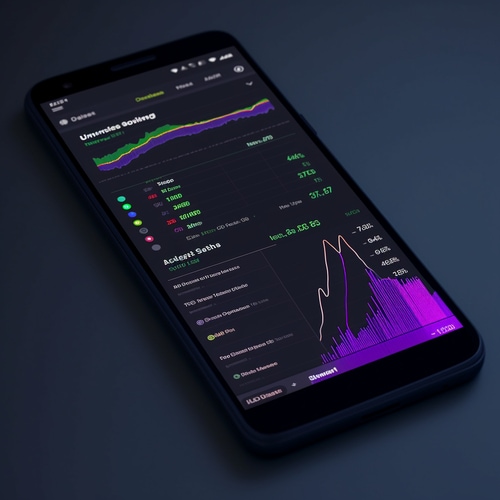Detecting Cell Phone Spyware On Android

If you suspect that someone may be spying on your Android phone, it's important to know how to go about detecting any spyware that they may have installed.
There are a few ways spyware can be installed on Android, so it's important to check for all of them and know how to detect their presence.
In this article, you will learn about the most effective ways to detect spyware on an Android smartphone.
13 Ways To Detect Spyware On Android Phones
While modern spyware is highly advanced and can infiltrate nearly every area of your phone, it also has certain inherent weaknesses that can tip you off to its presence. If you know what to look for and are aware of the following detection methods, you can feel a lot more secure using your phone.
1. Reduced Performance

One of the most common signs that your phone has been infected is a sudden decrease in performance. If it starts lagging, crashing, or otherwise acting abnormally, it may be due to monitoring software running in the background and taking up valuable resources.
2. Increased Battery Drain
Another symptom of spyware on your Android is increased battery drain. These applications often run constantly, even when your phone is not being used, which can cause your battery to drain more quickly than usual.
If you notice that your battery is draining faster than normal, even when you're not using your smartphone very much, it's a good idea to check for spyware.
3. Unexpected Reboots
If the mobile device starts shutting down or restarting on its own, this could be a sign that spyware is running in the background. Some tracking applications may cause Android to crash and reboot. In other cases, the software may reboot the device when it updates itself.
4. High Data Usage

If the data usage has spiked for no apparent reason, it's possible spyware is to blame. Some spyware may use your data connection to send information to whoever put it on the Android device, leading to higher than normal data usage.
4. Strange Text Messages
If strange text messages are received, especially ones containing random numbers or symbols, this could be a sign your smartphone has been compromised. These types of messages are often used to communicate with the hacker spying on you.
5. Screen Turning On in Sleep Mode

If the screen turns on while in sleep mode, this could be a sign spyware is present. Some spy apps may cause the phone to wake up in order to send information back to the person who installed it or to perform certain activities.
6. Long Boot Time And Crashes
When it takes noticeably longer to boot up or is crashing more often, this could be another symptom of spyware. These apps often run constantly as background processes, leading to increased strain on the processor and other resources, leading to a longer boot time and more crashes.
7. Unknown Apps
If there are apps that you didn't install yourself, they may be there to spy on you. These apps may masquerade as harmless programs but may actually be malicious software designed to steal your information or track your activity.
8. Suspicious Activity in Battery Usage Stats
If the phone's battery usage stats and see suspicious activity, you should be concerned. You may see apps you don't recognize using up a lot of battery power or odd spikes in usage even if the phone is idle.
9. Ads Appearing in Unexpected Places
If ads suddenly start appearing in places where they shouldn't be, such as in your notification bar or on your home screen, it's possible you are infected with adware. This type of spyware is designed to display advertisements in order to generate revenue for the person who put it there.
10. Extended Shut Down Time
If it takes a long time to shut down, this could be another sign spyware is present. When you try to shut down, the spyware may still be running in the background and will need to be closed before the device can be turned off completely. This shutdown sequence can sometimes require finishing uploading your data to the hackers responsible for the spyware, making it take unusually long to shut down.
11. Phone Running Hotter Than Usual

The increased activity from the spyware can cause the processor to work harder. Because smartphones have poor heat dissipation, they can become noticeably warm or hot during times of heavy usage. If your phone is warm even though it should have been idle, you should suspect that spyware is running in the background.
12. Difficulty Connecting to Security Sites
If you're unable to connect to sites offering security or anti-virus protection, it's likely that malware is blocking these types of connections. This is often done in order to prevent you from downloading software that could remove the spy app from your device.
13. Unusual Phone Behavior

In general, if your phone is behaving in a way you can't explain, or that seems unusual, it's possible a spy app is to blame. If there is doubt about whether or not your information has is compromised, it's always a good idea to run a virus scan just to be safe.
FAQ
How do I get rid of spyware on my Android phone?
If it is likely your phone is infected with spyware, there are things you can do to try to uninstall it. First, you can try installing an anti-malware app from the Google Play Store. These apps can sometimes detect and remove spyware. You can also try factory resetting your device, which will erase all of the data on your device including any spyware that may be present. However, this will also delete any personal data or files that you have on your phone, so be sure to make a backup first.
Can I prevent spyware from infecting my phone?
There are a few things you can do to try and protect yourself from spy apps in the first place. First, only download apps from trusted sources such as the Google Play Store. Avoid downloading apps from unknown websites or third-party app stores, as these are more likely to contain malicious software. You should also be careful about what permissions you grant to apps and deny any that do not seem needed. If an app is asking for more permissions than it needs, it may be trying to collect more data than it should have access to. Finally, keep your Android operating system up to date, as newer versions often include security fixes that can help protect against new threats.
What should I do if I think my phone is infected with malware?
If your phone may have been infected with malware, the best thing to do is run a virus scan using an anti-malware app. You can also try factory resetting your phone, but this will delete all of the data on your device including any personal files or data you have stored on it. Be sure to back up anything important before proceeding. If there is still reason for concern about the security of your device, you can always contact your wireless carrier or the manufacturer of your phone for assistance.
Conclusion
It can be frightening to consider that you may have a spy app running on your phone and someone has is spying on you, but luckily there are a few things you can do to protect yourself and your privacy. Pay attention to the signs that your device may be infected, and if you think it is, take steps to remove the spyware and secure your device. With a little vigilance, you can help keep your Android phone safe from spies.


 Apps That Detect Spyware
Apps That Detect Spyware How To Find Spying Apps On Your Cell Phone
How To Find Spying Apps On Your Cell Phone How To Remove A Hidden Spy Phone App On Android
How To Remove A Hidden Spy Phone App On Android Find Hidden Spy Apps On Android
Find Hidden Spy Apps On Android Best Apps For Spying On A Smartphone
Best Apps For Spying On A Smartphone